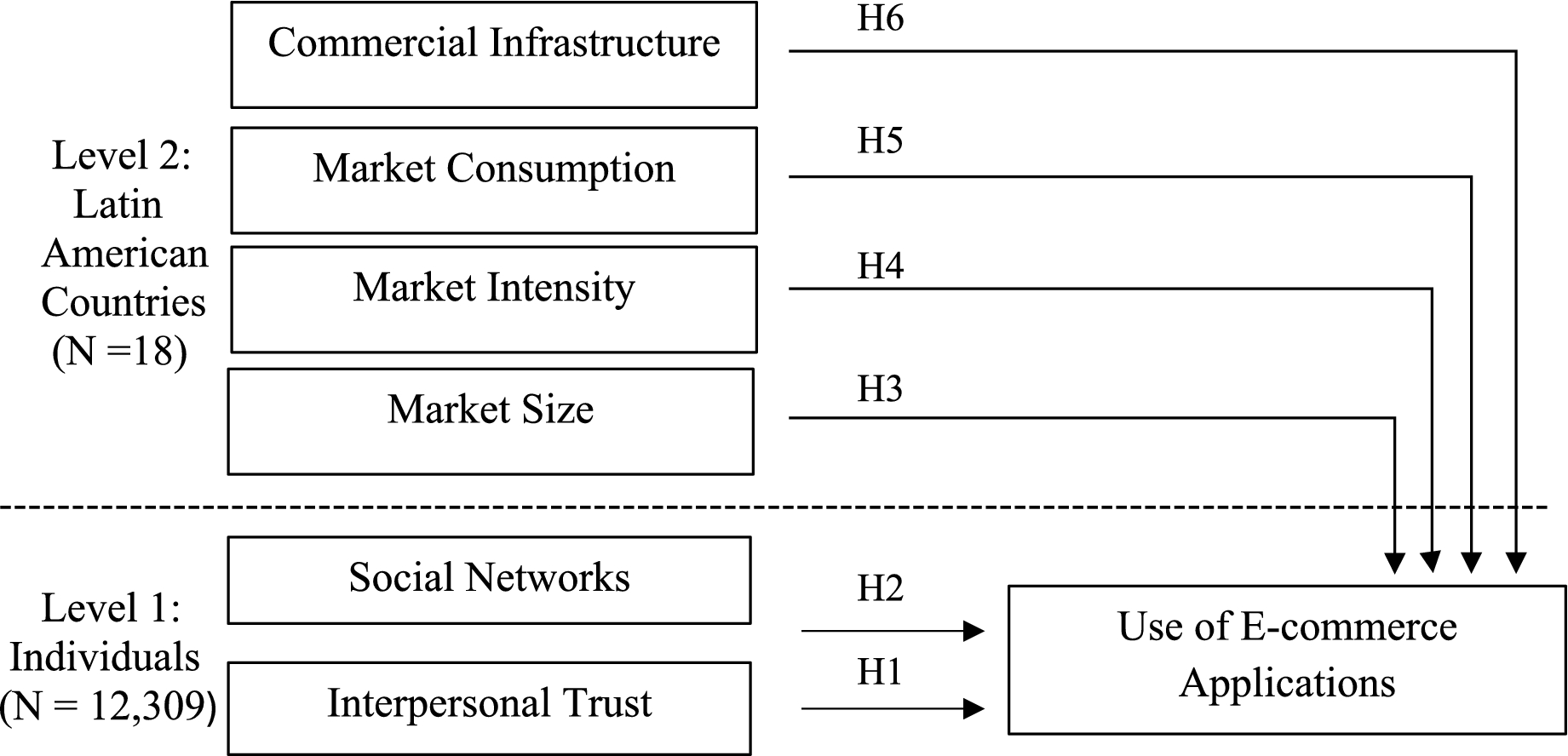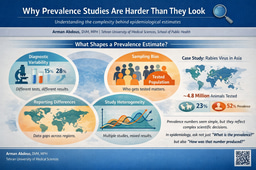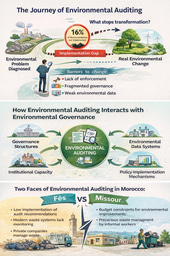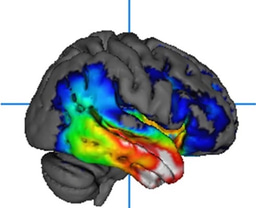The use of e-commerce applications in Latin America: individual and structural influences during COVID-19
Published in Research Data and Arts & Humanities

E-commerce Adoption in Latin America During COVID-19: Individual Behavior, Structural Conditions, and What Happens Behind the Research
Introduction
The COVID-19 pandemic triggered one of the fastest and most profound digital transformations ever recorded, particularly in emerging economies such as those of Latin America. While e-commerce adoption surged almost overnight, the mechanisms driving this shift were far from uniform. My research explored a central question: Why did some people adopt e-commerce apps much more readily than others, and how did national market conditions shape this behavior?
This blog post expands on the scientific article I recently published, offering not only a summary of the findings but also the behind-the-scenes elements of the project — how the study was conceived, why these questions matter to me personally, and how they can benefit members of this Community.
Why This Study? A Personal and Regional Motivation
Growing up and working in Latin America, I have always witnessed the stark inequalities that shape access to technology. When COVID-19 hit, these gaps became painfully visible — people who relied entirely on face-to-face transactions suddenly faced lockdowns and mobility restrictions. Yet others shifted seamlessly into digital purchasing.
I wanted to understand:
-
What explains these differences?
-
Are they purely individual — trust, digital habits, social media engagement?
-
Or are they structural — infrastructure, purchasing power, logistics, connectivity?
-
And how much does each level actually matter?
This research became, in many ways, a way to make sense of what I was seeing around me: families struggling with digital divides, small businesses forced online, and entire markets accelerating into digitalization unevenly.
Behind the Research: How the Study Was Built
To answer these questions, I used two large datasets:
1. Latinobarómetro 2020 (individual-level data)
A long-standing public opinion database with responses from 18 Latin American countries. It provided:
-
interpersonal trust
-
social network usage (Facebook, Instagram, WhatsApp)
-
self-reported social class
-
age and gender
-
and most importantly, which e-commerce apps people used (Mercado Libre, Amazon, food delivery apps)
After cleaning missing values, the final dataset included 12,309 respondents.
2. Market Potential Index (country-level data)
This database captures national-level market characteristics, such as:
-
market size
-
market intensity
-
consumer capacity
-
commercial infrastructure (logistics, internet speed, broadband, paved roads, mobile subscribers, etc.)
This allowed us to pair each individual with the structural profile of their country.
Why Use a Multilevel Model? The Hidden Challenge
One of the biggest methodological challenges was the fact that individuals are nested within countries. This means that:
-
People from the same country share economic conditions, cultural patterns, and digital infrastructure.
-
This violates the independence assumption required in traditional regression models.
To solve this, we used a multilevel regression model with random intercepts. This approach lets us:
-
examine individual differences and structural differences simultaneously
-
quantify how much variation in behavior is due to personal factors versus country factors
-
avoid biased conclusions that might blame individuals for behaviors shaped by structural constraints
An interesting behind-the-scenes moment:
When we ran the Null Model, we discovered that 12% of all variation in e-commerce use comes strictly from country-level differences — a remarkably high number for behavioral research.
Key Findings: What Really Drives E-commerce Use?
1. Interpersonal trust matters — a lot
Trust reduces perceived risk. People who trust others are more willing to buy online, share information, and try digital payments.
This aligns with Latin America’s context, where institutional trust is often low, making interpersonal trust even more valuable.
2. Social media usage is the strongest predictor
Individuals who used more social networks (especially WhatsApp, Instagram, and Facebook) were far more likely to adopt e-commerce apps.
Social networks serve as:
-
marketplaces
-
channels for recommendations
-
spaces where risk is reduced through social proof
During lockdowns, this became even more evident as small sellers and large platforms converged on social media.
3. Structural factors matter — but less than expected
Three structural variables had positive, but modest effects:
-
market size
-
consumer capacity (purchasing power)
-
commercial infrastructure
These factors help determine access to digital platforms (internet quality, logistics, payments).
4. Market intensity had no significant effect
Contrary to expectations, per capita income and private consumption did not explain differences in e-commerce use.
This suggests that adoption is not simply a matter of national wealth — digital readiness, trust, and social habits play a larger role.
Interpreting These Results: What They Mean for the Community
For researchers, practitioners, and policymakers in this Community, the study provides several insights:
1. Digital adoption is both social and technological
E-commerce adoption is not merely a product of “better technology” but rather:
-
how people perceive trust
-
how they use social networks
-
how countries structure their commercial ecosystems
This supports the UTAUT model’s emphasis on social influence and facilitating conditions.
2. Infrastructure still sets the boundaries
Even if individuals are willing, adoption can only flourish where logistics, connectivity, and payment systems are available.
This is especially relevant for members working on digital transformation strategies.
3. Social media is no longer auxiliary — it is central
For businesses and digital innovators, social media is not just marketing.
It is a gateway to e-commerce adoption, especially in emerging markets where formal digital ecosystems are uneven.
Why This Study Matters to Me — and to Our Community
This research sits at the intersection of economics, technology, and social behavior, a combination I find deeply meaningful.
For me personally, the study reflects a desire to understand how digitalization can either empower or exclude people in regions marked by structural inequality.
For the Community, I hope this research contributes by:
-
encouraging discussions on inclusive digital transformation
-
offering a methodological reference for multilevel analysis
-
and fostering debate on how trust, infrastructure, and social behavior shape technology adoption
Conclusion
The adoption of e-commerce applications in Latin America during COVID-19 was not random. It resulted from a complex interplay of personal trust, social media engagement, and national economic and technological conditions.
By combining individual and structural data, this study demonstrates that digital adoption in emerging markets requires both human and infrastructural readiness.
I look forward to hearing your thoughts, questions, and perspectives, and engaging further with this Community to deepen these discussions.
Follow the Topic
-
Future Business Journal

This is an open access, peer-reviewed journal publishing theoretical and empirical research papers covering the major aspects of management, accounting, economics, management information systems and finance.
Related Collections
With Collections, you can get published faster and increase your visibility.
Entrepreneurial Ecosystems and Economic Development
The concept of entrepreneurial ecosystems has gained significant traction in recent years, emphasizing the interconnectedness of various actors—such as startups, investors, policy-makers, and support organizations—that collectively contribute to economic development. These ecosystems provide a framework for understanding how innovative businesses can thrive within a supportive environment, fueled by the interplay of resources, networks, and local culture. By studying these dynamic ecosystems, researchers can uncover best practices and strategies that enhance the viability of entrepreneurial ventures and regional innovation systems.
The exploration of entrepreneurial ecosystems is crucial in today's rapidly changing economic landscape. Advances in understanding these ecosystems have led to the development of more effective policies and practices that foster startup growth, promote entrepreneurial finance, and support incubators and accelerators. Additionally, researchers are uncovering the importance of inclusive growth, ensuring that underrepresented communities can benefit from economic opportunities. This body of work contributes not only to the academic discourse but also offers practical implications for policymakers seeking to stimulate sustainable economic development.
Continued research in this field holds promise for refining the frameworks that underpin entrepreneurial ecosystems, potentially leading to innovative policies that enhance regional resilience and adaptability. As researchers delve deeper into the roles of innovation clusters and policy-driven entrepreneurship, there may be new pathways for addressing economic disparities and ensuring that entrepreneurship is accessible to all segments of society.
Short list of topic of interests:
- The role of incubators and accelerators in startup success
- Impact of entrepreneurial finance on regional innovation
- Policy-driven entrepreneurship for sustainable growth
- Analysis of innovation clusters and their economic impact
This Collection supports and amplifies research related to SDG 8 (Decent Work and Economic Growth).
Publishing Model: Open Access
Deadline: Jul 08, 2026
Internationalization and Foreign Direct Divestment Flows in Central and Eastern European Economies
Globalization has created the critical concept of internalization of firms and the world has become boundaryless world. There are many studies that are carried out on the determinants of foreign direct divestment in European Countries [EC]. But there are no much studies on foreign direct divestment in the Central and Eastern European countries. Hence, it could be concluded that studies regarding internationalization of firms especially those that are responsible for owning and operating units in foreign locations are the need of the day. The multinational companies that own and operate units in foreign locations (CEE) countries are being considered as drivers of internationalization and globalization. These multinational companies promote interdependence between Central and Eastern European countries and internationalization. They are therefore regarded as key actors in the globalization process of Central and Eastern European economies.
Despite the fact that there are many qualitative studies [non-empirical] on the determinants of foreign direct divestment, empirical [quantitative] studies on the drivers of foreign direct divestment (or foreign direct divestment inflows) are negligible in case Central and Eastern European countries. There are also limited researches [qualitative] in regard to the impact of COVID-19 on the economies of Central and Eastern European Countries. Similarly, the empirical studies on the drivers of foreign direct divestment inflows in respect of Central and Eastern European countries are also nonexistent. It is therefore, imperative to examine the post COVID-19 drivers of internationalization and foreign direct divestment [inflows] in Central and Eastern European countries.
In light of the above, this thematic issue proposes to examine the determinants of foreign direct divestment [inflows]. The investigation will be conducted through a review of the theoretical and empirical literature. The papers may use empirical model to investigate the drivers of foreign direct divestment [inflows] in the Central and Eastern European economies in particular. Panel data econometric techniques may also be used by the prospective authors to estimate the empirical model. The results of this study will have policy implications for the Central and Eastern European economies in particular. The special issue will also focus on the effects of POST-COVID-19 on the FDD inflows in Central and Eastern European Countries.
Tentative Topics:
The major thrust should be on the following issues:
Internationalization of Central and Eastern European countries;
Role and contribution of internationalization in the development of Central and Eastern European countries;
FDD Flows as a means of promoting internationalization in Central and Eastern European countries;
Pre COVID-19 FDD inflows in Centra and Eastern European countries;
Post COVID-19 Growth pattern of FDD inflows in Central and Eastern European economies;
Factors governing and affecting FDI inflows in Central and Eastern European economies;
Promotion of trade and investment relations among the Central and Eastern European economies;
Availability of incentives from the host countries to foreign investors under the persisting intensified competition among Central and Eastern European countries;
Post-COVID-19 FDI Policy in Central and Eastern European countries;
Emerging issues and challenges for Central and Eastern European economies for FDI inflows post COVID-19.
Time frame for the Issue:
• Launch for the Call for Papers: 1 September 2025
• Last Date of submission of papers: 28 February 2026
Publishing Model: Open Access
Deadline: May 31, 2026






Please sign in or register for FREE
If you are a registered user on Research Communities by Springer Nature, please sign in